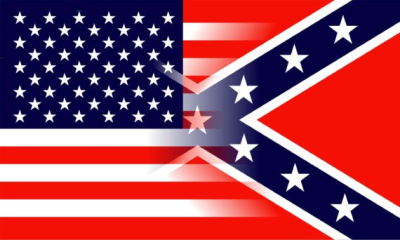About Publications Library Archives
heritagepost.org

Preserving Revolutionary & Civil War History

Preserving Revolutionary & Civil War History

The Confederacy did NOT seek to annihilate the North, nor exercise their influence upon it, nor foist its cultural and social values on it, nor rule it; they sought to LEAVE IT.
Robert E. Lee gives us a clear view of how the South understood the rules of war in his General Order 73, issued in 1863 during the Pennsylvania campaign:
“No troops could have displayed greater fortitude or better performed the arduous marches of the past ten days.
Their conduct in other respects has with few exceptions been in keeping with their character as soldiers and entitles them to approbation and praise. There have however been instances of forgetfulness on the part of some, that they have in keeping the yet unsullied reputation of the army, and that the duties expected of us by civilization and Christianity are not less obligatory in the country of the enemy than in our own. The commanding general considers that no greater disgrace could befall the army and through it our whole people, than the perpetration of the barbarous outrages upon the unarmed, and defenseless [sic] and the wanton destruction of private property that have marked the course of the enemy in our own country.
Such proceedings not only degrade the perpetrators and all connected with them, but are subversive of the discipline and efficiency of the army, and destructive of the ends of our present movement. It must be remembered that we make war only upon armed men and that we cannot take vengeance for the wrongs our people have suffered without lowering ourselves in the eyes of all whose abhorrence has been excited by the atrocities of our enemies, and offending against Him to whom vengeance belongeth, without whose favor and support our efforts must all prove in vain.
The commanding general therefore earnestly exhorts the troops to abstain from most scrupulous care from unnecessary or wanton injury to private property, and he enjoins upon all officers to arrest and bring to summary punishment all who shall in any way offend against the orders on this subject.” – (The Wartime Papers of R. E. Lee (New York: Bramhall House, 1961, pages 533-534)
Writing in his book, “April 1865” (which was called “A superb piece of history” by ultra-pro Lincoln court historian Doris Kearns Goodwin, author of her own hagiographical book “Team of Rivals,” upon which the Steven Spielberg movie “Lincoln” was based) author Jay Winik documents Lee’s views on warfare:
“But as great a fighting man, as he was, Lee had had his flaws, with many of the virtues of a man becoming vices as a commander… he was not stern enough with his men… Nor was he cruel enough. In contrast to a Sherman or a Sheridan, he refused to burn or plunder enemy property, or engage in selective assassination, declaring it ‘Unchristian’ and “atrocious,’ even though the South could have greatly benefited from such tactics.”
Facing certain military defeat should he continue to fight by conventional means, Lee’s young Chief of Artillery E. Porter Alexander recommended that the Confederate armies in the field evaporate into the Hills where they could wage guerrilla warfare for as long as it took to force the North to sicken of the cost, Lee opposed the idea.
Winik writes:
“Lee, however, principled to the bitter end, was thinking not about personal glory, but along quite different lines. What is honorable? What is proper? What is right? …he quickly reasoned that a guerrilla war would make a wasteland of all that he loved. Brother would be set against brother, not just for four years, but for generations. Such a war would surely destroy Virginia, and just as surely destroy the country as well. Even if it worked, and perhaps especially if it worked… For Lee, that was too high a price to pay. No matter how much he loved the Cause… there were limits to Southern Independence.
However, there were no limits that the Federal forces recognized regarding what should be sacrificed to Lincoln’s mythical concept of a “perpetual sacred Union.”
Contrast Lee’s view of warfare with those of marauding incendiary Huns like Sherman and Sheridan; compare Lee’s concern for his troops with Grant, whose callous use of his men as cannon fodder to be sacrificed in their tens of thousands on the altar of Union Victory earned him the title “the Butcher” by pro-Union newspapers in the North when he lost over 50,000 men during the Wilderness campaign – a staggering number when one considers that the same Army lost only twice that, 100,000, in all the previous three years of the war.
Lincoln’s own wife Mary stated:
“Grant is a butcher and not fit to be at the head of an army… He loses two men to the enemy’s one. He has no management, no regard for life.” (Winik, “April 1865” page 98)
This is not to say that there were no acts of individual criminality or even reprisal raids in response to Northern attacks on Southern civilians and civilian property.